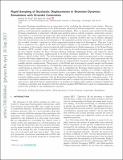Rapid sampling of stochastic displacements in Brownian dynamics simulations with stresslet constraints
Author(s)
Fiore, Andrew Michael; Swan, James W
DownloadSubmitted version (639.0Kb)
Terms of use
Metadata
Show full item recordAbstract
Brownian Dynamics simulations are an important tool for modeling the dynamics of soft matter. However, accurate and rapid computations of the hydrodynamic interactions between suspended, microscopic components in a soft material are a significant computational challenge. Here, we present a new method for Brownian dynamics simulations of suspended colloidal scale particles such as colloids, polymers, surfactants, and proteins subject to a particular and important class of hydrodynamic constraints. The total computational cost of the algorithm is practically linear with the number of particles modeled and can be further optimized when the characteristic mass fractal dimension of the suspended particles is known. Specifically, we consider the so-called "stresslet" constraint for which suspended particles resist local deformation. This acts to produce a symmetric force dipole in the fluid and imparts rigidity to the particles. The presented method is an extension of the recently reported positively split formulation for Ewald summation of the Rotne-Prager-Yamakawa mobility tensor to higher order terms in the hydrodynamic scattering series accounting for force dipoles [A. M. Fiore et al., J. Chem. Phys. 146(12), 124116 (2017)]. The hydrodynamic mobility tensor, which is proportional to the covariance of particle Brownian displacements, is constructed as an Ewald sum in a novel way which guarantees that the real-space and wave-space contributions to the sum are independently symmetric and positive-definite for all possible particle configurations. This property of the Ewald sum is leveraged to rapidly sample the Brownian displacements from a superposition of statistically independent processes with the wave-space and real-space contributions as respective covariances. The cost of computing the Brownian displacements in this way is comparable to the cost of computing the deterministic displacements. The addition of a stresslet constraint to the over-damped particle equations of motion leads to a stochastic differential algebraic equation (SDAE) of index 1, which is integrated forward in time using a mid-point integration scheme that implicitly produces stochastic displacements consistent with the fluctuation-dissipation theorem for the constrained system. Calculations for hard sphere dispersions are illustrated and used to explore the performance of the algorithm. An open source, high-performance implementation on graphics processing units capable of dynamic simulations of millions of particles and integrated with the software package HOOMD-blue is used for benchmarking and made freely available in the supplementary material. Keywords: Colloids; Brownian Motion; Hydrodynamics; Coarse Graining; Constraints; Simulations
Date issued
2018-01-28Department
Massachusetts Institute of Technology. Department of Chemical EngineeringJournal
Journal of Chemical Physics
Publisher
AIP Publishing
Citation
Fiore, Andrew M. and Swan, James W., "Rapid sampling of stochastic displacements in Brownian dynamics simulations with stresslet constraints." Journal of Chemical Physics 148, 4 (January 2018): no. 044114. © 2018 Author(s).
Version: Original manuscript
ISSN
0021-9606
1089-7690